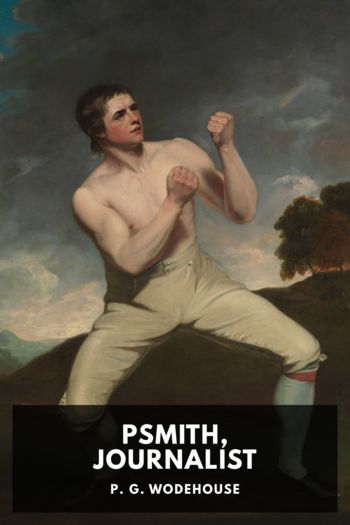Leave It to Psmith by P. G. Wodehouse (best ereader for academics TXT) 📕

- Author: P. G. Wodehouse
Book online «Leave It to Psmith by P. G. Wodehouse (best ereader for academics TXT) 📕». Author P. G. Wodehouse
Mr. Cootes correctly interpreted this question as a feeler with regard to his views on this new development, and decided to accept the situation. True, he had hoped to enter the castle in a slightly higher capacity than that of a gentleman’s personal gentleman, but he was an old campaigner. Once in, as he put it to himself with admirable common sense, he would be in.
“Yes, sir,” he replied.
“Capital,” said Psmith. “Capital. Then will you look after Cootes, Beach.”
“Very good, sir,” said the butler in a voice of cordial approval. The only point he had found to cavil at in Psmith had been removed; for it had hitherto pained him a little that a gentleman with so nice a taste in clothes as that dignified guest should have embarked on a visit to such a place as Blandings Castle without a personal attendant. Now all was explained and, as far as Beach was concerned, forgiven. He proceeded to escort Mr. Cootes to the rear. They disappeared behind the rhododendrons.
They had hardly gone when a sudden thought came to Psmith as he sat once more in the coolness of the hall. He pressed the bell. Strange, he reflected, how one overlooked these obvious things. That was how generals lost battles.
“Sir?” said Beach, appearing through the green baize door.
“Sorry to trouble you again, Beach.”
“Not at all, sir.”
“I hope you will make Cootes comfortable. I think you will like him. His, when you get to know him, is a very winning personality.”
“He seems a nice young fellow, sir.”
“Oh, by the way, Beach. You might ask him if he brought my revolver from town with him.”
“Yes, sir,” said Beach, who would have scorned to betray emotion if it had been a Lewis gun.
“I think I saw it sticking out of his pocket. You might bring it to me, will you?”
“Very good, sir.”
Beach retired, to return a moment later. On the silver salver which he carried the lethal weapon was duly reposing.
“Your revolver, sir,” said Beach.
“Thank you,” said Psmith.
VIFor some moments after the butler had withdrawn in his stately pigeon-toed way through the green baize door, Psmith lay back in his chair with the feeling that something attempted, something done, had earned a night’s repose. He was not so sanguine as to suppose that he had actually checkmated an adversary of Mr. Cootes’s strenuousness by the simple act of removing a revolver from his possession; but there was no denying the fact that the feel of the thing in his pocket engendered a certain cosy satisfaction. The little he had seen of Mr. Cootes had been enough to convince him that the other was a man who was far better off without an automatic pistol. There was an impulsiveness about his character which did not go well with the possession of firearms.
Psmith’s meditations had taken him thus far when they were interrupted by an imperative voice.
“Hey!”
Only one person of Psmith’s acquaintance was in the habit of opening his remarks in this manner. It was consequently no surprise to him to find Mr. Edward Cootes standing at his elbow.
“Hey!”
“All right, Comrade Cootes,” said Psmith with a touch of austerity, “I heard you the first time. And may I remind you that this habit of yours of popping out from unexpected places and saying ‘Hey!’ is one which should be overcome. Valets are supposed to wait till rung for. At least, I think so. I must confess that until this moment I have never had a valet.”
“And you wouldn’t have one now if I could help it,” responded Mr. Cootes.
Psmith raised his eyebrows.
“Why,” he inquired, surprised, “this peevishness? Don’t you like being a valet?”
“No, I don’t.”
“You astonish me. I should have thought you would have gone singing about the house. Have you considered that the tenancy of such a position throws you into the constant society of Comrade Beach, than whom it would be difficult to imagine a more delightful companion?”
“Old stiff!” said Mr. Cootes sourly. “If there’s one thing that makes me tired, it’s a guy that talks about his darned stomach all the time.”
“I beg your pardon?”
“The Beach gook,” explained Mr. Cootes, “has got something wrong with the lining of his stomach, and if I hadn’t made my getaway he’d be talking about it yet.”
“If you fail to find entertainment and uplift in firsthand information about Comrade Beach’s stomach, you must indeed be hard to please. I am to take it, then, that you came snorting out here, interrupting my daydreams, merely in order to seek my sympathy?”
Mr. Cootes gazed upon him with a smouldering eye.
“I came to tell you I suppose you think you’re darned smart.”
“And very nice of you, too,” said Psmith, touched. “A pretty compliment, for which I am not ungrateful.”
“You got that gun away from me mighty smoothly, didn’t you?”
“Since you mention it, yes.”
“And now I suppose you think you’re going to slip in ahead of me and get away with that necklace? Well, say, listen, lemme tell you it’ll take someone better than a half-baked string-bean like you to put one over on me.”
“I seem,” said Psmith, pained, “to detect a certain animus creeping into your tone. Surely we can be trade rivals without this spirit of hostility. My attitude towards you is one of kindly tolerance.”
“Even if you get it, where do you think you’re going to hide it? And, believe me, it’ll take some hiding. Say, lemme tell you something. I’m your valet, ain’t I? Well, then, I can come into your room and be tidying up whenever I darn please, can’t I? Sure I can. I’ll tell the world I can do just that little thing. And you take it from me, Bill …”
“You persist in the delusion that my name is William …”
“You take it from me, Bill, that if ever that necklace disappears and it isn’t me that’s done





Comments (0)